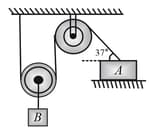K K Sharma Solutions for Chapter: Newton's Laws of Motion, Exercise 1: TOPICWISE QUESTIONS
K K Sharma Physics Solutions for Exercise - K K Sharma Solutions for Chapter: Newton's Laws of Motion, Exercise 1: TOPICWISE QUESTIONS
Attempt the practice questions on Chapter 5: Newton's Laws of Motion, Exercise 1: TOPICWISE QUESTIONS with hints and solutions to strengthen your understanding. Chapterwise/Topicwise Daily Practice Problems (DPP) Mechanics I NEET solutions are prepared by Experienced Embibe Experts.
Questions from K K Sharma Solutions for Chapter: Newton's Laws of Motion, Exercise 1: TOPICWISE QUESTIONS with Hints & Solutions
In the figure shown below, blocks and move with velocities and , respectively, along the horizontal direction. The ratio of is
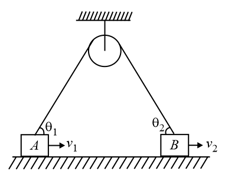
In the arrangement shown in the figure, the ends and of an unstretchable string move downwards with a uniform speed . Pulleys and are fixed. Calculate the speed with which mass moves upwards.
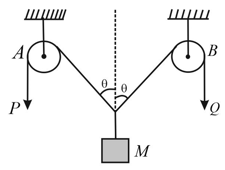
In the figure shown, the pulley is moving with the velocity . The velocity of the block attached with the string is
The velocity of end of a rigid rod, placed between two smooth vertical walls, is along the vertical direction. The velocity of end of the rod is (The rod always remains in contact with the vertical walls.)
Block is moving towards the right with a constant velocity Velocity of the block with respect to block is (assume all the pulleys and strings are ideal).
In the figure shown below, block moves down with a velocity . The velocity of , in the position shown, is
The acceleration of block , in the figure, will be (assume all the surfaces are frictionless; pulleys and strings are ideal)
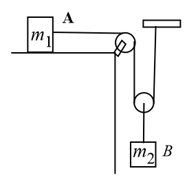
Calculate the acceleration of mass and the tension in the string connecting to mass, shown in the figure (the strings are weightless and inextensible; the pulleys are weightless and frictionless).
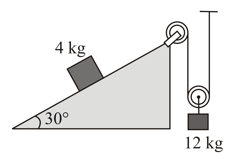
Take acceleration due to gravity as .




